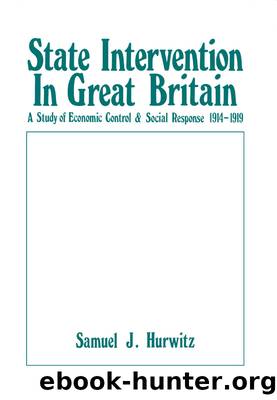State Intervention in Great Britain: Study of Economic Control and Social Response, 1914-1919 by Samuel J Hurwitz

Author:Samuel J Hurwitz [Hurwitz, Samuel J]
Language: eng
Format: epub
Tags: Political Science, General
ISBN: 9781136931932
Google: 9QxYAQAAQBAJ
Goodreads: 18704406
Publisher: Routledge
Published: 2013-10-15T00:00:00+00:00
CHAPTER X
COAL
THE British people lived not by bread alone. Britain's position as a significant industrial power rested truly on a foundation of coal. Coal mining was, after agriculture, the foremost industry of Great Britain, as well as one of the oldest, having been born, it seems, almost simultaneously with the Great Charter.1 It was a, if not the, key industry, around which the others revolved; nearly all industrial production was fundamentally dependent upon it.2 Britain's commercial supremacy was not due solely to her geographic location or to the âspirit and enterprise of her people.â Coal was used to fuel and ballast the ships which brought bulky raw materials to Britain and left with the more compact manufactured articles. Britain owed her commercial supremacy in large part to her coal.
The coal supply of Britain was not inexhaustible, but its limits had not been approached. Estimates varied, but even the lowest placed the easily available coal reserves at well over 100,000,000,000 tons.3 Yet the warnings of Jevons, first uttered in 1865, although exaggerated by his epigones, contained a fundamental basis of truth. In the age of steam, coal had become the chief source of power, and Jevons viewed the problem of coal supply with a pessimism reminiscent of Malthus' approach to the problem of food supply.4
Although Britain's competitive position with respect to coal had deteriorated as compared to the United States and Germany, she was still, in 1913, by far the largest exporter of coal and second only to the United States in production. In 1913 the United Kingdom produced over 287,000,000 tons or over one-fifth of the world's output, with an average value of 10s. 2d. per ton. About one-third of this, amounting to 10 per cent of the total value of all British exports, was either exported or used for bunker coal for foreign trade. Total shipments of coal amounted to 97,000,000 tons of which about one-fourth was for bunkers. The value of coal, coke, and manufactured fuel exported was over £53,000,000.5
The capital invested in the 3,000 coal mines of the United Kingdom, worked by 1,500 companies and individuals, was about £135,000,000, yielding, on the average, an 11 per cent return on the capital invested. Over 1,100,000 persons, producing a per capita average of 259 tons, were employed in the coal mining industry. The coal properties, or royalties, as they were commonly termed, were vested in the hands of about 4,000 owners.6 Profits amounted to about one-fourth of the price of coal: average wages were 5s. 6d. per ton, stores and pit wood 1s., general expenses inclusive of everything except depreciation and interest, 1s. 3d., and profit 2s. 5d.7 The average value at the pithead was 8s. 9d. per ton.8 Put in another way, the total profits before the war amounted to £19,000,000 a year, less £6,000,000 for royalties.9
Custom and the plentiful supply of labor at relatively low costs hindered the introduction of machinery. Fifty per cent of the coal produced in the United States was mechanically cut, as compared to eight per cent in the United Kingdom.
Download
This site does not store any files on its server. We only index and link to content provided by other sites. Please contact the content providers to delete copyright contents if any and email us, we'll remove relevant links or contents immediately.
International Integration of the Brazilian Economy by Elias C. Grivoyannis(106941)
The Radium Girls by Kate Moore(12006)
Turbulence by E. J. Noyes(8011)
Nudge - Improving Decisions about Health, Wealth, and Happiness by Thaler Sunstein(7684)
The Black Swan by Nassim Nicholas Taleb(7092)
Rich Dad Poor Dad by Robert T. Kiyosaki(6583)
Pioneering Portfolio Management by David F. Swensen(6277)
Man-made Catastrophes and Risk Information Concealment by Dmitry Chernov & Didier Sornette(5987)
Zero to One by Peter Thiel(5772)
Secrecy World by Jake Bernstein(4732)
Millionaire: The Philanderer, Gambler, and Duelist Who Invented Modern Finance by Janet Gleeson(4451)
The Age of Surveillance Capitalism by Shoshana Zuboff(4272)
Skin in the Game by Nassim Nicholas Taleb(4228)
The Money Culture by Michael Lewis(4178)
Bullshit Jobs by David Graeber(4169)
Skin in the Game: Hidden Asymmetries in Daily Life by Nassim Nicholas Taleb(3983)
The Dhandho Investor by Mohnish Pabrai(3746)
The Wisdom of Finance by Mihir Desai(3722)
Blockchain Basics by Daniel Drescher(3570)
